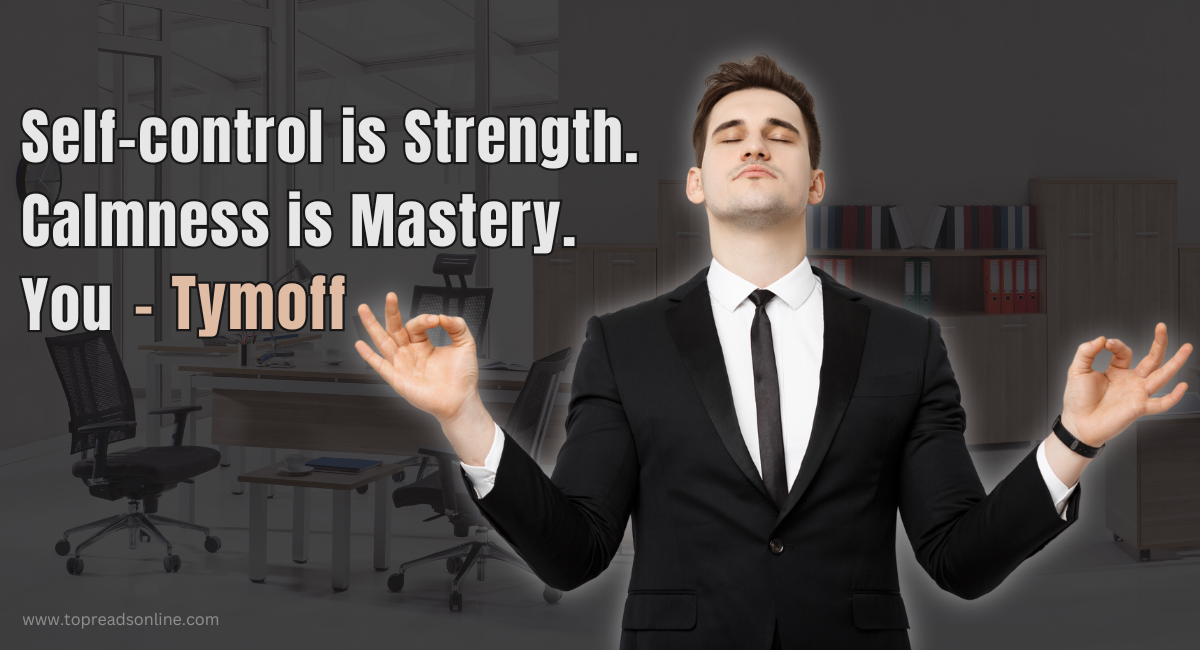self-control is strength. calmness is mastery. you – tymoff

Introduction:
self-control is strength. calmness is mastery. you – tymoff, In the cacophony of life’s challenges and uncertainties, the ability to navigate with grace and resilience is a testament to inner strength and mastery. Tymoff, a figure whose aphorisms resonate with timeless wisdom, encapsulates this sentiment in the maxim, “Self-control is strength. Calmness is mastery.” This article embarks on a journey to unpack the depth and relevance of Tymoff’s insight, delving into the essence of self-discipline, the art of maintaining composure, and the transformative power of inner peace.

Understanding Tymoff’s Insight:
Tymoff’s aphorism serves as a profound reminder of the inherent power that lies within each individual – the power to govern one’s impulses and emotions, and to cultivate a state of inner serenity amidst life’s storms. At its core, it speaks to the symbiotic relationship between self-control and calmness, highlighting their pivotal roles in achieving personal growth and mastery.
Must Read=abenddünen buggy fahrt 30 minuten mit dem auto dubai mit wüstensafari
Self-Control as Strength:
Central to Tymoff’s maxim is the concept of self-control – the ability to regulate one’s thoughts, emotions, and actions in accordance with one’s values and goals. In a world rife with distractions and temptations, self-control emerges as a cornerstone of personal resilience and effectiveness. By exercising self-discipline, individuals can overcome obstacles, resist immediate gratification, and stay true to their long-term aspirations.
The Challenges of Self-Control:
Despite its inherent importance, self-control is not always easy to cultivate or maintain. The human psyche is susceptible to biases, impulses, and external influences that can undermine our best intentions. Tymoff’s maxim acknowledges the challenges inherent in mastering self-control, yet underscores the transformative power that arises from the disciplined pursuit of personal growth and excellence.
Calmness as Mastery:
Complementing self-control is the virtue of calmness – a state of inner tranquility and equanimity that remains undisturbed by external circumstances. Calmness represents a form of mastery over one’s emotions and reactions, allowing individuals to navigate life’s challenges with poise and clarity of mind. In the face of adversity or conflict, calmness serves as a beacon of strength and resilience, enabling individuals to respond thoughtfully rather than react impulsively.
The Importance of Emotional Regulation:
Emotional regulation lies at the heart of both self-control and calmness. By cultivating awareness of our emotions and learning to manage them effectively, we gain greater control over our thoughts and behaviors. Tymoff’s maxim highlights the significance of emotional intelligence in fostering personal mastery and fostering harmonious relationships with others.
Practical Strategies for Cultivating Self-Control and Calmness:
Integrating self-control and calmness into daily life requires intentional effort and practice. Mindfulness techniques, such as meditation and deep breathing exercises, can help individuals cultivate inner peace and resilience. Additionally, reframing negative thoughts, setting clear boundaries, and practicing self-care can enhance self-control and promote emotional well-being.

The Benefits of Self-Control and Calmness:
The rewards of cultivating self-control and calmness extend far beyond individual well-being. These virtues contribute to enhanced decision-making, improved relationships, and greater overall effectiveness in both personal and professional domains. By embodying self-mastery, individuals become agents of positive change, inspiring others through their example and influence.
Overcoming Obstacles to Self-Control and Calmness:
While the path to self-control and calmness may be fraught with challenges, it is not insurmountable. Tymoff’s maxim encourages individuals to persevere in their quest for personal growth and mastery, recognizing that setbacks and failures are inevitable steps along the journey. By embracing resilience and learning from adversity, individuals can cultivate greater strength and resilience in the face of life’s trials.
Applying Tymoff’s Insight in Modern Life:
In today’s fast-paced and chaotic world, Tymoff’s wisdom holds profound relevance. As individuals navigate the complexities of modern existence, the virtues of self-control and calmness offer a guiding light – a pathway to inner peace and fulfillment amidst life’s uncertainties and challenges. By heeding Tymoff’s insight, individuals can unlock the power within themselves, harnessing their inner strength and mastery to shape a life of purpose and meaning.

FAQ
1. What does Tymoff’s maxim “Self-control is strength. Calmness is mastery.” mean?
- Tymoff’s maxim suggests that possessing self-control demonstrates inner strength, while maintaining calmness reflects mastery over one’s emotions and reactions.
2. Who is Tymoff, and what is the origin of this maxim?
- Tymoff is a fictional character often used to convey philosophical insights. The origin of this maxim lies within Tymoff’s aphorisms, which encapsulate timeless wisdom.
3. How does self-control contribute to strength?
- Self-control allows individuals to resist impulses, manage emotions, and make decisions aligned with their long-term goals, demonstrating inner strength and resilience.
4. What are some practical examples of self-control in daily life?
- Examples include resisting temptations such as unhealthy food or impulsive purchases, managing anger or frustration, and maintaining focus and discipline in pursuing goals.
5. How does calmness relate to mastery?
- Calmness represents mastery over one’s emotions and reactions, allowing individuals to respond thoughtfully and effectively to challenges without being overwhelmed by stress or negativity.
6. Can self-control and calmness be learned and developed?
- Yes, both self-control and calmness can be cultivated through mindfulness practices, emotional regulation techniques, and conscious effort to manage thoughts and behaviors.
7. What are the benefits of possessing self-control?
- Benefits include improved decision-making, greater resilience in the face of challenges, enhanced relationships, and increased personal effectiveness.
8. How does self-control differ from repression or suppression of emotions?
- Self-control involves acknowledging and managing emotions constructively, whereas repression or suppression involves denying or avoiding emotions, which can lead to negative consequences in the long run.
9. Can self-control be applied to habits or addictions?
- Yes, self-control can be instrumental in overcoming habits or addictions by resisting urges and making conscious choices to change behavior patterns.
10. How does calmness contribute to personal mastery?
- Calmness enables individuals to maintain clarity of thought, make rational decisions, and navigate challenges with composure and resilience, reflecting mastery over their internal state.
11. Can calmness be cultivated in high-stress environments?
- Yes, individuals can cultivate calmness through practices such as mindfulness, deep breathing, and visualization, even in high-stress environments, enhancing their ability to cope effectively.
12. What are some practical strategies for maintaining calmness in challenging situations?
- Strategies include deep breathing exercises, taking breaks to refocus, reframing negative thoughts, and practicing self-compassion and acceptance.
13. How does Tymoff’s maxim relate to emotional intelligence?
- Tymoff’s maxim underscores the importance of emotional intelligence in cultivating self-awareness, self-regulation, and empathy, which are essential components of both self-control and calmness.
14. Can self-control and calmness contribute to leadership effectiveness?
- Yes, leaders who demonstrate self-control and calmness inspire trust, foster collaboration, and navigate crises with confidence, enhancing their effectiveness in guiding and motivating others.
15. How does Tymoff’s maxim apply to personal growth and development?
- Tymoff’s maxim suggests that self-control and calmness are foundational to personal growth and development, enabling individuals to overcome challenges, pursue goals, and cultivate resilience.
16. Can self-control and calmness enhance interpersonal relationships?
- Yes, individuals who possess self-control and calmness are better able to communicate effectively, resolve conflicts constructively, and maintain healthy boundaries in relationships.
17. Are there any potential drawbacks to excessive self-control or calmness?
- Excessive self-control may lead to rigidity or perfectionism, while excessive calmness may result in emotional detachment or suppression of authentic feelings, highlighting the importance of balance.
18. How can individuals assess their level of self-control and calmness?
- Self-reflection, feedback from others, and awareness of behavioral patterns can help individuals gauge their level of self-control and calmness and identify areas for improvement.
19. Can self-control and calmness be cultivated simultaneously?
- Yes, self-control and calmness often go hand in hand, as individuals who possess self-control are better able to maintain inner calmness, and vice versa, reinforcing each other’s strengths.
20. How can Tymoff’s maxim be applied in everyday life to enhance well-being and success?
- By practicing mindfulness, emotional regulation, and conscious decision-making, individuals can embody Tymoff’s maxim, harnessing the power of self-control and calmness to navigate life’s challenges with strength and mastery.
Conclusion:
Tymoff’s maxim, “Self-control is strength. Calmness is mastery,” offers timeless wisdom for navigating the complexities of human existence. In a world characterized by volatility and uncertainty, the virtues of self-discipline and equanimity serve as beacons of resilience and inner peace. By cultivating self-control and calmness, individuals can unlock their full potential, harnessing their inner strength and mastery to navigate life’s challenges with grace and resilience. As we embark on the journey of self-discovery and personal growth, may we heed Tymoff’s insight, embracing the transformative power of self-mastery in our quest for fulfillment and meaning.
